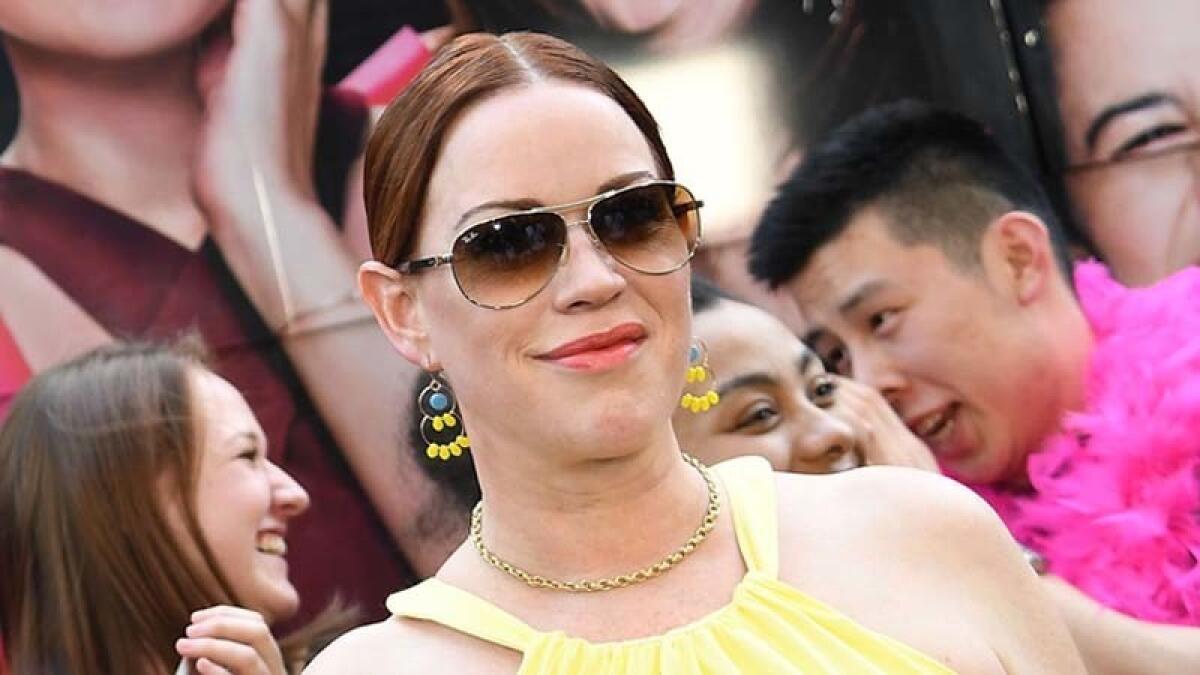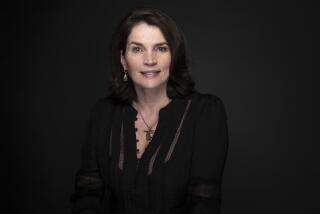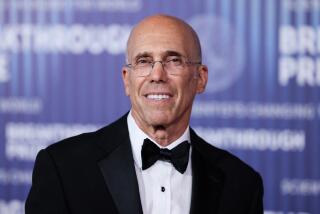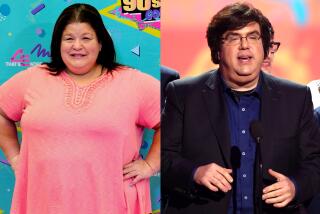Molly Ringwald essay prompts Jeffrey Katzenberg to apologize for lewd comment he denies making

- Share via
Molly Ringwald’s experiences with Harvey Weinstein were, she says, more a matter of bad taste than bad behavior. But that can’t be said about the rest of Hollywood when she was a career-on-fire young actress fueled by her success in the films of John Hughes.
“Thankfully, I wasn’t cajoled into a taxi [by Weinstein], nor did I have to turn down giving or getting a massage,” Ringwald wrote Tuesday in an essay for the New Yorker. “I was lucky. Or perhaps it was because, at that moment in time, I was the one with more power. ‘The English Patient,’ Weinstein’s first Best Picture winner, was still a few years away.”
Women with power — Meryl Streep and Hillary Clinton, to name a couple — seem to have been spared advances from the now-disgraced producer, whose alleged decades-old habits were outed in stories by the New York Times and New Yorker only two weeks ago. A-list victims such as Angelina Jolie and Gwyneth Paltrow say they were targeted years before they became “Angelina” and “Gwyneth.”
Ringwald, who said she had been “warned” about Weinstein, talked about changes he made to “Loser Takes All” on its way to being rechristened 1990’s “Strike It Rich,” which ultimately bombed. She talked about having to sue for her contractually guaranteed share of the movie’s gross.
“I was always a little mystified that Harvey had a reputation as a great tastemaker when he seemed so noticeably lacking in taste himself,” the “Breakfast Club” star wrote. “But he did have a knack for hiring people who had it, and I figured that’s what passes for taste in Hollywood.”
Then she talked about her reception when, burned out, she moved to Paris and pulled back on her career, coming home only occasionally to work.
“The magazine Movieline decided to feature me on its cover, I guess because anyone who leaves Hollywood after having success seems intriguing on some level,” she wrote. “In that [1995] article, the head of a major studio — and, incidentally, someone who claims himself to be horrified by the Harvey allegations — was quoted as saying, ‘I wouldn’t know [Molly Ringwald] if she sat on my face.’ I was twenty-four at the time. Maybe he was misquoted. If he ever sent a note of apology, it must have gotten lost in the mail.”
I never talked about these things publicly because, as a woman, it has always felt like I may as well have been talking about the weather.
— Molly Ringwald, writing in the New Yorker
Enter Jeffrey Katzenberg, who was chairman of Walt Disney Studios when Disney acquired Weinstein’s Miramax Film Corp. in 1993. Eight days ago, the WndrCo honcho decried Weinstein’s behavior and went public with a scathing email he had sent the producer in response to a desperate plea the latter sent to fellow Hollywood heavyweights, begging for support as the scandal began to break.
In a statement Tuesday to the Hollywood Reporter, Katzenberg denied having said what was attributed to him in the Movieline story.
“Anyone who knows me now or back then knows I do not use language like that as a matter of course, or tolerate it,” Katzenberg told THR. “Ms. Ringwald, 22 years too late, I am deeply, deeply sorry.”
Somewhat lost in the OMG-he-said-what discussion about Katzenberg vis-à-vis Ringwald have been the sexually charged situations the “Sixteen Candles” actress described in her New Yorker essay. There was the 50-year-old crew member who allegedly told her at 13 that he would teach her to dance, then pushed up against her while sporting an erection; the married film director who stuck his tongue in her mouth while she was 14 and on set; the director who had a lead actor put a dog collar around her neck during an audition, despite it having nothing to do with the scene or the story.
“I never talked about these things publicly because, as a woman, it has always felt like I may as well have been talking about the weather…,” wrote Ringwald, who considers herself lucky to have had protective parents who tried to shield her when she was a young star.
“My hope,” she wrote, “is that Hollywood makes itself an example and decides to enact real change.”
More to Read
The biggest entertainment stories
Get our big stories about Hollywood, film, television, music, arts, culture and more right in your inbox as soon as they publish.
You may occasionally receive promotional content from the Los Angeles Times.











